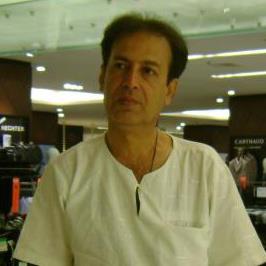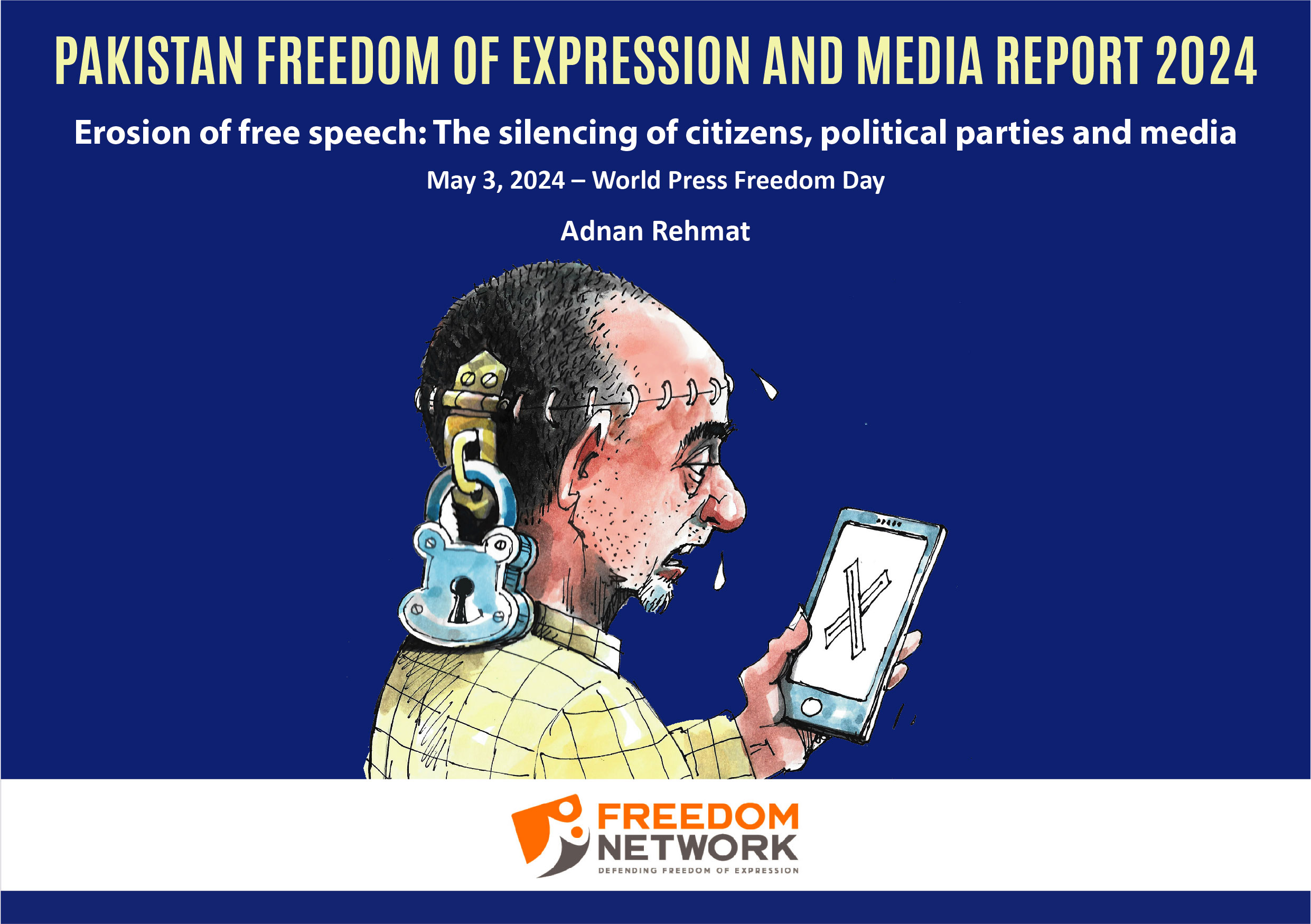Ghulam Mustafa
Pakistan Federal Union of Journalists has always been at the forefront of striving to win rights for journalists. Whether be a dictatorship or whether it be a democratic government, this organization presented itself as a wall in trying to ensure freedom for journalists. Keeping in view the situation prevalent today, Freedom Network sat down with Ayub Jan Sarhindi – the Secretary-General of Pakistan Federal Union of Journalists, to discuss attacks on journalists and measures his organization is taking to protect media which is under severe pressure from all sides just ahead of national elections on July 25 this year.
The following are the excerpts of the interview.
Freedom Network: Keeping in view the challenges faced by journalists in Pakistan today over their freedom and well-being, how does PFUJ look into it?
Ayub Sarhandi: We have kept in check these challenges for a long period of time. We have also been working on these challenges for some time. In a third-world country like Pakistan, a journalist faces much more danger and is much more unsafe than in any other country of the world. Keeping this statement in mind, on numerous occasions we have not only talked to owners but also various governments and tried to convince them to provide security to journalists. We have tried to convince owners to train journalists in the same manner that journalists abroad are trained as. Journalists should be provided with a guideline so that they carry out their duties according to the stipulated guideline provided. They should be provided with life-jackets. They are compulsory. The zones in which they work, anyone at any time could kill them. In Pakistan it is possible that if a journalist provides an opinion against any politician or the forces themselves – his life is in acute danger. Furthermore there is no trusting them as they could kill you anywhere or involve you in any accident anywhere. We have fought legal cases on this matter. Therefore it is a necessary that the owners provide basic needs to a journalist who is about to go out for work in the field. In Pakistan, a race has begun between news channels in which journalists have been ordered to provide as many breaking news as possible – something that has made him more unsafe. Shots are being fired, conditions are worsening but the journalist continues on in his quest into the warzone to bring in breaking news without him being concerned for his safety. Inside the MCR, he is repeatedly being told, “broadcast this, broadcast that” and suddenly the journalist, while he continues to broadcast, finds himself shot or something unfortunate has happened to him. We need to end this and for it we have planned accordingly. By taking onboard not only the owners but the government as well, PFUJ conducted workshops on the basic necessities and rights of journalists and will continue to hold such workshops in the forthcoming future. We will continue to train journalists that they should protect their lives primarily and that as a matter of fact if they are alive they will be able to provide news but if they themselves are not alive there will not be any news.
FN: During the five-year tenure of the Pakistan Muslim League (N), a total of 18 journalists were killed in the line of duty. However there is a perception that exemptions are being granted for crimes being committed against journalists. How has the PFUJ planned to eradicate this perception?
AS: “This a good question. We see that most of the journalists that are attacked or those shaheed journalist friends of us that were martyred in the line of duty have legal cases and proceedings being carried out of their murder. Despite this we are unable to identify their killer’s identities. In some cases we know that a particular force is behind this journalist’s killing or a particular agency was involved or a particular politician was involved. Despite this information there is a lack of planning on our part. When these cases are referred to courts, they usually pick up any uncanny person who is not involved in the incident and pass a judgement against him – just to showcase that the case has concluded. This should not be happening. We have developed a legal team of ours that will take part in these cases while they are being run inside court rooms. By the grace of the Almighty the team will be presented in front of all very soon. Where our journalists feel danger or are threatened, we will no longer stay quiet. If unfortunately one of our journalist is killed or any case is made up against him, our legal team will handle and run his case.”
FN: In Pakistan, in the face of the independence of speech, journalism and the protection of journalists, the journalistic community’s various factions and numerous organizational groups have become major hindrance blocks. To counter these challenges what actions has the PFUJ undertaken?
AS: Significant amount of work has been done at PFUJ, however if factions are present to gain a personal advantage then such factions are not supported and are not present in the PFUJ. I can categorically state that our journalists that are part of the Pakistan Federal Union of Journalists are clean. We do not support any particular ideology and our only goal is the protection, safety and well-being of journalists. When did these factions start to form? These factions began with the emergence of owners. Owners wanted to run away from the ‘Wage Awards’ as they did not want to pay their journalists their wages on time. The owner did not want to provide all the facilities to journalists as delineated in the PFUJ’s charter – those that should be provided according to the 2001 Service Condition Act. Whatever facilities are present inside the Act, the owners do not wish to provide them. PFUJ demanded that these facilities be provided to journalists – however when such facilities were not provided so the PFUJ staged sit-ins and raised demonstrations – acts that made the owners unhappy. The ‘Wage Award’ issue is a huge issue. Many owners refused to give it and even today only a few give it away. Those that do give it, give it under pressure from the PFUJ. To eliminate this wage award, many organizations and the owners got together and planned for it. Whenever they see their own goals for their own profits they merge together. Thus they began a guesswork amongst journalists. They started buying our weak people. According to the ‘Wage Award’, my salary should be around 25 to 30 thousand rupees. However, if I am offered 0.3 or 0.5 million rupees I will definitely do as they say. This is how they began to divide the organization. Around two or three branches of PFUJ were formed because the owners vandalized their offices. As a result, our journalists became stuck in a quagmire. We were in full support of the organization, are in full support and will remain in full support. Whenever any owner is under pressure we try and lend our full support because failure to do so will result in the unemployment of our people. The time though has arrived that we do not spare any owners. What we demand is our basic right – we do not demand any bungalows or cars, we simply demand what is rightfully and legally ours. On numerous occasions we have said that all of us should come together and sit on one table to eradicate these factions. We have demanded that the weak should be kept aside as they only work for their own benefits. This organization is for the poor, weak and needy and not for the people seeking to take advantage of it. There is a lot of hard work, lots of sacrifices need to be made to run this organization and no individual ends up earning anything singularly as everything is done collectively. We are still trying to mend this organization. We admit that we will not allow such a person to become part of the organization who is working on a hidden agenda. We have opened our doors to all so that we can create a strong journalist – something that will strengthen this organization as a result. By the grace of the Almighty, our PFUJ is the first step on the ladder to a strong organization.
FN: In June 2018, the Army branded some journalists as ‘state enemies’. As a result, the PFUJ demanded that the Army should take back this statement – which it eventually did. Was this a confusion or an issue?
AS: As far as this event is concerned, as soon as we were informed that a few of our journalists’ pictures were shown on social media and were branded as ‘state enemies’ action was taken all across Pakistan by us. We have never bowed down in front of any dictator and nor has anyone made us bow to them. We declared it an issue. The following day, they met our delegation at a meeting that was also attended by the President and they made it clear that they had no intentions of doing what they did. The story ended there and then. Even today, if one of journalists is blamed without substantial evidence we will stand by him. We do not claim that our journalists are clean but a journalist who works against Pakistan will never be accommodated by the Pakistan Federal Union of Journalists. We never tell our journalists to conspire against the country. No journalist tends to conspire against his country – if he does so he is not a Pakistani. A journalist writes as he sees and speaks what he feels. Pakistan Federal Union of Journalists will never allow anyone to quell freedom of expression and freedom of information.
FN: General elections in Pakistan are scheduled to be held on July 25. What steps has the PFUJ taken to ensure safety of journalists during this time period?
AS: First of all, we were hopeful of conducting sessions which would inform journalists how they should protect themselves and carry out their reporting during the Elections. Secondly, we urge the owners not to pressurize any journalist to work. We will try to implement an international law of coverage and we would also like the government to facilitate journalists by providing them their basic rights and protection. We are planning this and next week we have arranged for a meeting and a workshop to align ourselves for the Elections. A set of suggestions would also be passed on to the Election Commission to ensure that they are announced – which delineates the standard of reporting and coverage for the Elections. This will ensure that our journalists’ lives are safe while covering the Elections.
“Journalists' Safety First:” PFUJ Secretary-General
- June 29, 2018
- 1:50 pm
- No Comments
More from the News section
July 26, 2023
No Comments
June 20, 2023
2 Comments
March 21, 2023
No Comments
August 30, 2022
No Comments
August 30, 2022
No Comments

Resize text-+=
